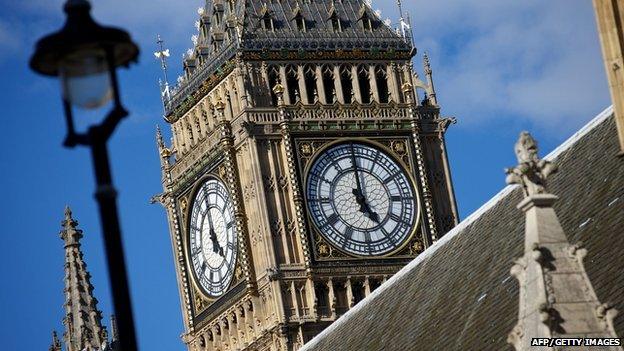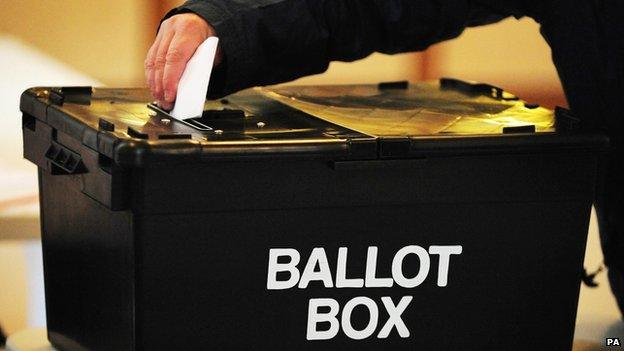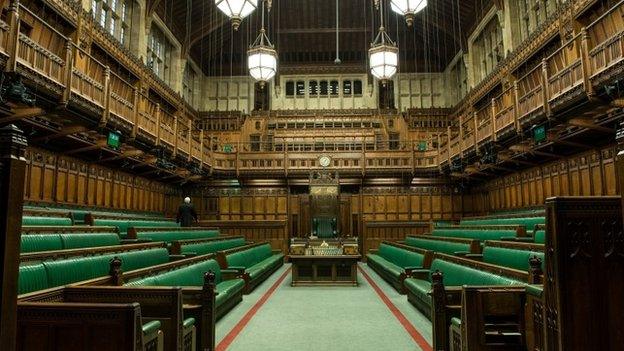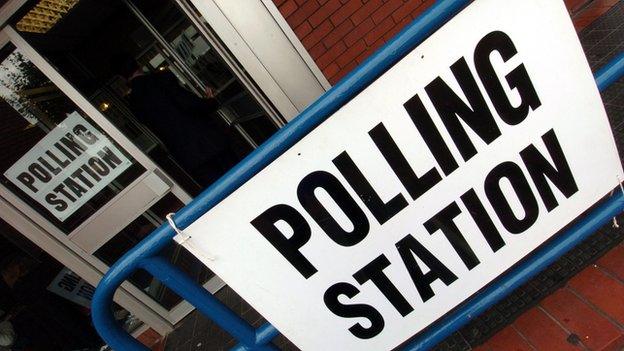Newsbeat's general election jargon buster
- Published

Ballot, manifesto, party, pledge, swing...
You'll be hearing words like these pretty often between now and the general election on 7 May.
We're now in the official campaign period, when the different political parties will be working hard to win your vote.
It can be a lot to take in, so Newsbeat's come up with this special jargon buster for you to keep handy!

A voter puts their ballot paper into a ballot box
Austerity - this is basically living without things that aren't necessary and making do with limited resources. An austerity measure is an official action taken by a government to reduce the amount of money that it spends.
Ballot box - the sealed box in which you put your ballot paper after you've voted.
Ballot paper - the paper on which you cast your vote, by marking an X in the box next to the name of the person you want to win.
By-election - a one-off election that happens in between general elections, usually when an area's MP has died or resigned.
Candidate - a person who's running in an election, usually representing a political party.
Coalition - when two or more parties join together to make a government (when no party has a majority). This is what the Conservatives and Liberal Democrats did after the last general election.
Constituency - the area that your elected MP represents. There are 650 constituencies in the UK (and, as a result, 650 MPs).
Deficit - the difference between what the government collects in taxes and what it spends. Cutting the country's deficit is a key talking point.
Electoral register - the list of everyone who's registered to vote. You need to be on it to be able to vote on 7 May.
How to make sure you can vote
First past the post - is the voting system we use. Despite the name, there is no actual 'post', it just means that the candidate with the most votes wins.
Fiscal- The word "fiscal" mainly refers to how the government manages the country's finances: raising taxes, government spending and how much the UK has to borrow
Government - the government runs the country and is usually formed by the party that wins the election, or by a coalition.
House of Commons - the elected bit of Parliament. Our MPs have their own chamber where they sit on green benches.
House of Lords - unlike MPs, Lords aren't elected but usually chosen for their experience. They do things like consider new proposed laws and check the work of the government. They sit on a red benches.
Hung parliament - if no party gets a majority (more than 50%) of seats then we have a hung parliament. No one gets hung though!
Kingmaker - if there's a hung parliament then smaller parties might be able to play 'kingmaker' to the bigger parties who need extra MPs to make up a government.
Landslide - a landslide means when a party wins loads more seats than the nearest rival party. Experts think it's unlikely this time.
Majority - this means one party winning more than 50% of seats in the House of Commons (the magic number is 326).
Manifesto - a list of a party's ideas and policies, outlining what it'll do if it wins the election.
Marginal seat - a constituency where the result is too close to call. The BBC defines this as an area that can be won by a 5% swing in the vote from one party to another.
MP - stands for Member of Parliament. Each of the 650 UK constituencies has an MP who represents his or her area's interests in the House of Commons.

Inside the House of Commons
Opposition - the political parties aren't in the government - they sit opposite the government in the House of Commons. The leader of the opposition party with the most seats is called the "Leader of the Opposition".
Parliament - is where new laws get debated and agreed. Parliament is made up of two 'houses' - the House of Commons and the House of Lords - and also, officially, the Queen but she doesn't get involved in decision-making.
Party - we're talking political party here, which refers to a group that have common political goals. Most MPs belong to a political party.
Pledge - a pledge is a promise from a political party.
Policy - is the posh name for a plan of action from the party.

A polling station
Polling station - is the place where you go to cast your vote - usually somewhere local to where you live, such as a school.
Prime minister - the person who is leader of the country and moves into 10 Downing Street. It's usually the leader of the biggest political party.
Referendum - a type of vote where voters are given the chance to decide on a major issue, by voting yes or no. One of the big issues this election is whether there should be a referendum on the UK being in the European Union.
Returning officer - the person chosen to make sure the area's vote goes smoothly and is done fairly. He or she will also announce the result.
Seat - when a candidate wins and becomes an MP, they win a 'seat' in the Houses of Parliament.
Spoilt ballot - when a voter hasn't voted properly on their ballot paper, such as by leaving it blank or writing more than one cross. Spoilt votes don't count towards the final result.
Swing - used to describe how much of a change in support there is from one party to another.
Term - a bit like a term at school or university, it means the fixed period of time between general elections. MPs are elected to serve for one term.
Turnout - the number or percentage of people who actually turned out to vote.
Follow @BBCNewsbeat, external on Twitter, BBCNewsbeat, external on Instagram and Radio1Newsbeat, external on YouTube